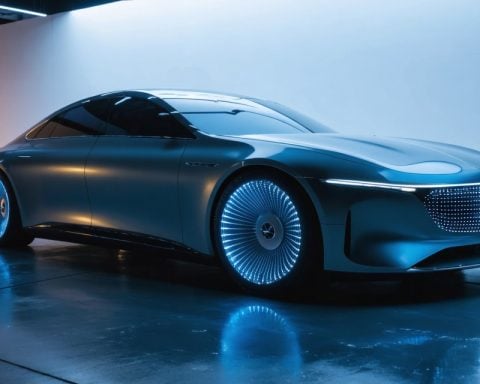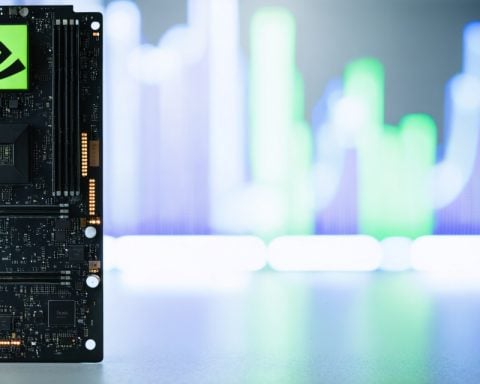- Mercedes EQS, with a solid-state battery, is revolutionizing electric mobility.
- Developed with Factorial Energy, the battery enhances range by 25%, allowing over 1,000 km (620 miles) on a single charge.
- Energy density of 450 Wh/kg sets new standards in electric vehicle performance.
- Safety is improved through solid electrolyte, avoiding risks linked to liquid components.
- Innovations like pneumatic actuators and passive cooling reduce weight and increase efficiency.
- Mercedes-Benz collaborates with AMG High Performance Powertrains, merging Formula 1 expertise with sustainable technology.
- Testing will continue until 2025, marking a significant leap towards greener, high-performance transport.
- This development reflects the blending of racing technology with everyday electric vehicles, shaping a sustainable future.
A modified Mercedes EQS is quietly making history on the winding roads of Germany. Beneath its sleek exterior lies a revolutionary solid-state battery, promising to reshape the future of electric mobility. In a fusion of cutting-edge Formula 1 innovation and green technology, Mercedes-Benz, along with its high-octane AMG High Performance Powertrains division, aims to electrify not just the road, but the entire automotive landscape.
Engineered with lithium-metal components from Factorial Energy, this solid-state marvel delivers a jaw-dropping 25% boost in range, propelling the EQS over 1,000 kilometers (620 miles) without a recharge. Picture a drive from Paris to Vienna on a single charge, with energy density soaring to 450 Wh/kg, pushing the boundaries of what’s possible.
But it’s not just about range. Safety vaults to new heights with a solid electrolyte, steering clear of traditional liquid risks, while pneumatic actuators deftly manage cell swelling. Coupled with intelligent passive cooling, the battery sheds unnecessary weight, making your ride not just longer but sleeker.
Mercedes’ collaboration with Factorial since 2021 has yielded not merely a battery, but a shift in paradigm—a beacon for greener, more efficient transport. As testing continues through 2025, this project underscores a pivotal trend: high-performance auto technology isn’t just for racetracks; it’s driving us into an electrified future.
For those plugged into the pulse of innovation, this dynamic shift offers a glimpse of what’s to come—a world where clean, efficient energy isn’t a dream, but a daily reality. As Mercedes-Benz blurs the lines between racetrack thrills and everyday drives, the road to the future glistens invitingly ahead.
“Revolutionizing the Electric Vehicle Landscape: The Game-Changing Solid-State Battery in the Mercedes EQS”
How Solid-State Technology Transforms Electric Vehicles: A Comprehensive Overview
Understanding Solid-State Batteries: Features, Specs, & Pricing
A solid-state battery, as highlighted by the Mercedes EQS prototype, uses a solid electrolyte compared to the liquid or gel electrolytes found in conventional lithium-ion or lithium-polymer batteries. The primary advantages lie in energy density, safety, and form factor:
– Energy Density: Solid-state batteries can achieve energy densities up to 450 Wh/kg, delivering 25% more range, as seen in the Mercedes EQS example.
– Safety: The absence of flammable liquid electrolytes significantly reduces the risk of thermal runaway, a common issue in traditional batteries.
– Form Factor & Weight: With solid-state technology, manufacturers can achieve a lighter and potentially more flexible design, offering automotive engineers new design possibilities.
Current market forecasts project that the global solid-state battery market will reach approximately $2 billion by 2030, fueled by innovations from automotive giants and startups alike.
Real-World Use Cases & Industry Trends
The success of solid-state technology in vehicles like the Mercedes EQS paves the way for broader applications in:
– Consumer Electronics: Extended battery life for smartphones and laptops.
– Renewable Energy Storage: Providing higher efficiency and stability for solar energy storage systems.
– Medical Devices: Offering reliable, long-lasting power for implantable devices like pacemakers.
The automotive industry is particularly poised for disruption as OEMs like Toyota and BMW also explore solid-state solutions, aiming for commercialization within the next five years.
Pros & Cons Overview
Pros:
– Increased Range: 25% higher compared to traditional batteries.
– Enhanced Safety: Reduced risk of fires and leaks.
– Lightweight and Compact Design: Contributes to vehicle efficiency.
Cons:
– Production Costs: Current manufacturing processes are expensive and complex, with scalability still a significant challenge.
– Material Availability: Some materials, such as lithium-metal, are in limited supply and require sustainable sourcing.
Controversies & Limitations
While promising, solid-state batteries face hurdles:
– Scalability: Transition from prototype to mass production remains a technical challenge that manufacturers are racing to address.
– Longevity: Long-term stability and lifecycle aging of solid-state batteries are areas needing further exploration and validation before widespread adoption.
Security & Sustainability
Security improvements are evident with reduced fire risks. However, sustainability hinges on responsible sourcing of lithium and other metals, paired with recycling initiatives to manage end-of-life concerns.
Actionable Recommendations for Current and Future EV Owners
1. Stay Informed: Keep abreast of announcements from key players like Mercedes, Toyota, and battery technology startups as their research could impact future vehicle purchasing decisions.
2. Consider Your Options: As EV technology evolves, it’s crucial to consider both current EV offerings and upcoming innovations like solid-state technology for future investments.
3. Advocate for Sustainability: Support brands that prioritize sustainable materials and recycling programs, ensuring that advancements in EV technology remain environmentally friendly.
For further insights into electric vehicle trends and technologies, explore Mercedes-Benz and Factorial Energy. The journey toward electrification is accelerating, and understanding these developments will position you at the forefront of this automotive revolution.












